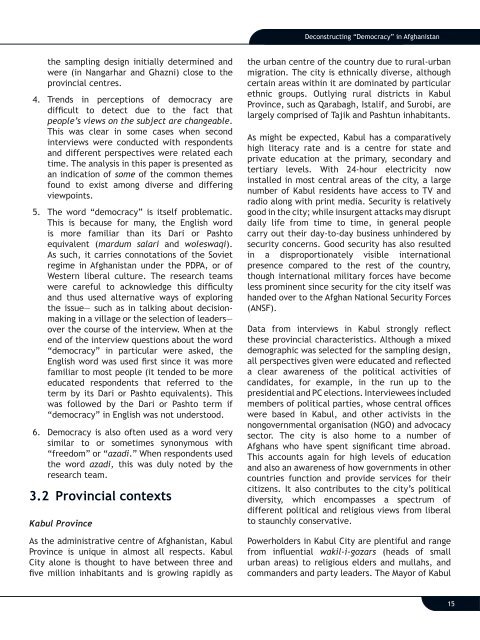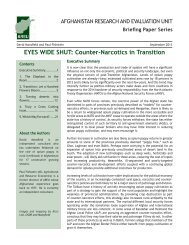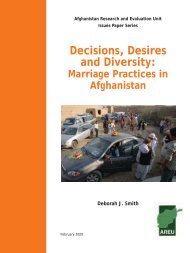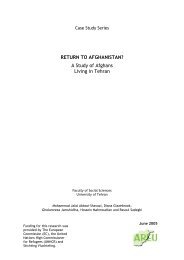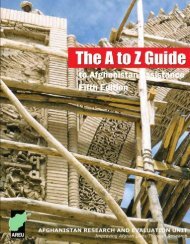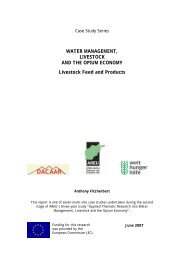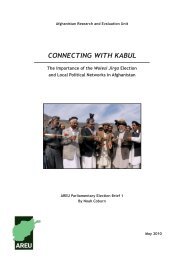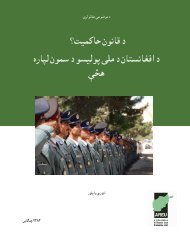“Democracy” in Afghanistan - the Afghanistan Research and ...
“Democracy” in Afghanistan - the Afghanistan Research and ...
“Democracy” in Afghanistan - the Afghanistan Research and ...
You also want an ePaper? Increase the reach of your titles
YUMPU automatically turns print PDFs into web optimized ePapers that Google loves.
Deconstruct<strong>in</strong>g <strong>“Democracy”</strong> <strong>in</strong> <strong>Afghanistan</strong><br />
<strong>the</strong> sampl<strong>in</strong>g design <strong>in</strong>itially determ<strong>in</strong>ed <strong>and</strong><br />
were (<strong>in</strong> Nangarhar <strong>and</strong> Ghazni) close to <strong>the</strong><br />
prov<strong>in</strong>cial centres.<br />
4. Trends <strong>in</strong> perceptions of democracy are<br />
difficult to detect due to <strong>the</strong> fact that<br />
people’s views on <strong>the</strong> subject are changeable.<br />
This was clear <strong>in</strong> some cases when second<br />
<strong>in</strong>terviews were conducted with respondents<br />
<strong>and</strong> different perspectives were related each<br />
time. The analysis <strong>in</strong> this paper is presented as<br />
an <strong>in</strong>dication of some of <strong>the</strong> common <strong>the</strong>mes<br />
found to exist among diverse <strong>and</strong> differ<strong>in</strong>g<br />
viewpo<strong>in</strong>ts.<br />
5. The word “democracy” is itself problematic.<br />
This is because for many, <strong>the</strong> English word<br />
is more familiar than its Dari or Pashto<br />
equivalent (mardum salari <strong>and</strong> woleswaqi).<br />
As such, it carries connotations of <strong>the</strong> Soviet<br />
regime <strong>in</strong> <strong>Afghanistan</strong> under <strong>the</strong> PDPA, or of<br />
Western liberal culture. The research teams<br />
were careful to acknowledge this difficulty<br />
<strong>and</strong> thus used alternative ways of explor<strong>in</strong>g<br />
<strong>the</strong> issue— such as <strong>in</strong> talk<strong>in</strong>g about decisionmak<strong>in</strong>g<br />
<strong>in</strong> a village or <strong>the</strong> selection of leaders—<br />
over <strong>the</strong> course of <strong>the</strong> <strong>in</strong>terview. When at <strong>the</strong><br />
end of <strong>the</strong> <strong>in</strong>terview questions about <strong>the</strong> word<br />
“democracy” <strong>in</strong> particular were asked, <strong>the</strong><br />
English word was used first s<strong>in</strong>ce it was more<br />
familiar to most people (it tended to be more<br />
educated respondents that referred to <strong>the</strong><br />
term by its Dari or Pashto equivalents). This<br />
was followed by <strong>the</strong> Dari or Pashto term if<br />
“democracy” <strong>in</strong> English was not understood.<br />
6. Democracy is also often used as a word very<br />
similar to or sometimes synonymous with<br />
“freedom” or “azadi.” When respondents used<br />
<strong>the</strong> word azadi, this was duly noted by <strong>the</strong><br />
research team.<br />
3.2 Prov<strong>in</strong>cial contexts<br />
Kabul Prov<strong>in</strong>ce<br />
As <strong>the</strong> adm<strong>in</strong>istrative centre of <strong>Afghanistan</strong>, Kabul<br />
Prov<strong>in</strong>ce is unique <strong>in</strong> almost all respects. Kabul<br />
City alone is thought to have between three <strong>and</strong><br />
five million <strong>in</strong>habitants <strong>and</strong> is grow<strong>in</strong>g rapidly as<br />
<strong>the</strong> urban centre of <strong>the</strong> country due to rural-urban<br />
migration. The city is ethnically diverse, although<br />
certa<strong>in</strong> areas with<strong>in</strong> it are dom<strong>in</strong>ated by particular<br />
ethnic groups. Outly<strong>in</strong>g rural districts <strong>in</strong> Kabul<br />
Prov<strong>in</strong>ce, such as Qarabagh, Istalif, <strong>and</strong> Surobi, are<br />
largely comprised of Tajik <strong>and</strong> Pashtun <strong>in</strong>habitants.<br />
As might be expected, Kabul has a comparatively<br />
high literacy rate <strong>and</strong> is a centre for state <strong>and</strong><br />
private education at <strong>the</strong> primary, secondary <strong>and</strong><br />
tertiary levels. With 24-hour electricity now<br />
<strong>in</strong>stalled <strong>in</strong> most central areas of <strong>the</strong> city, a large<br />
number of Kabul residents have access to TV <strong>and</strong><br />
radio along with pr<strong>in</strong>t media. Security is relatively<br />
good <strong>in</strong> <strong>the</strong> city; while <strong>in</strong>surgent attacks may disrupt<br />
daily life from time to time, <strong>in</strong> general people<br />
carry out <strong>the</strong>ir day-to-day bus<strong>in</strong>ess unh<strong>in</strong>dered by<br />
security concerns. Good security has also resulted<br />
<strong>in</strong> a disproportionately visible <strong>in</strong>ternational<br />
presence compared to <strong>the</strong> rest of <strong>the</strong> country,<br />
though <strong>in</strong>ternational military forces have become<br />
less prom<strong>in</strong>ent s<strong>in</strong>ce security for <strong>the</strong> city itself was<br />
h<strong>and</strong>ed over to <strong>the</strong> Afghan National Security Forces<br />
(ANSF).<br />
Data from <strong>in</strong>terviews <strong>in</strong> Kabul strongly reflect<br />
<strong>the</strong>se prov<strong>in</strong>cial characteristics. Although a mixed<br />
demographic was selected for <strong>the</strong> sampl<strong>in</strong>g design,<br />
all perspectives given were educated <strong>and</strong> reflected<br />
a clear awareness of <strong>the</strong> political activities of<br />
c<strong>and</strong>idates, for example, <strong>in</strong> <strong>the</strong> run up to <strong>the</strong><br />
presidential <strong>and</strong> PC elections. Interviewees <strong>in</strong>cluded<br />
members of political parties, whose central offices<br />
were based <strong>in</strong> Kabul, <strong>and</strong> o<strong>the</strong>r activists <strong>in</strong> <strong>the</strong><br />
nongovernmental organisation (NGO) <strong>and</strong> advocacy<br />
sector. The city is also home to a number of<br />
Afghans who have spent significant time abroad.<br />
This accounts aga<strong>in</strong> for high levels of education<br />
<strong>and</strong> also an awareness of how governments <strong>in</strong> o<strong>the</strong>r<br />
countries function <strong>and</strong> provide services for <strong>the</strong>ir<br />
citizens. It also contributes to <strong>the</strong> city’s political<br />
diversity, which encompasses a spectrum of<br />
different political <strong>and</strong> religious views from liberal<br />
to staunchly conservative.<br />
Powerholders <strong>in</strong> Kabul City are plentiful <strong>and</strong> range<br />
from <strong>in</strong>fluential wakil-i-gozars (heads of small<br />
urban areas) to religious elders <strong>and</strong> mullahs, <strong>and</strong><br />
comm<strong>and</strong>ers <strong>and</strong> party leaders. The Mayor of Kabul<br />
15


